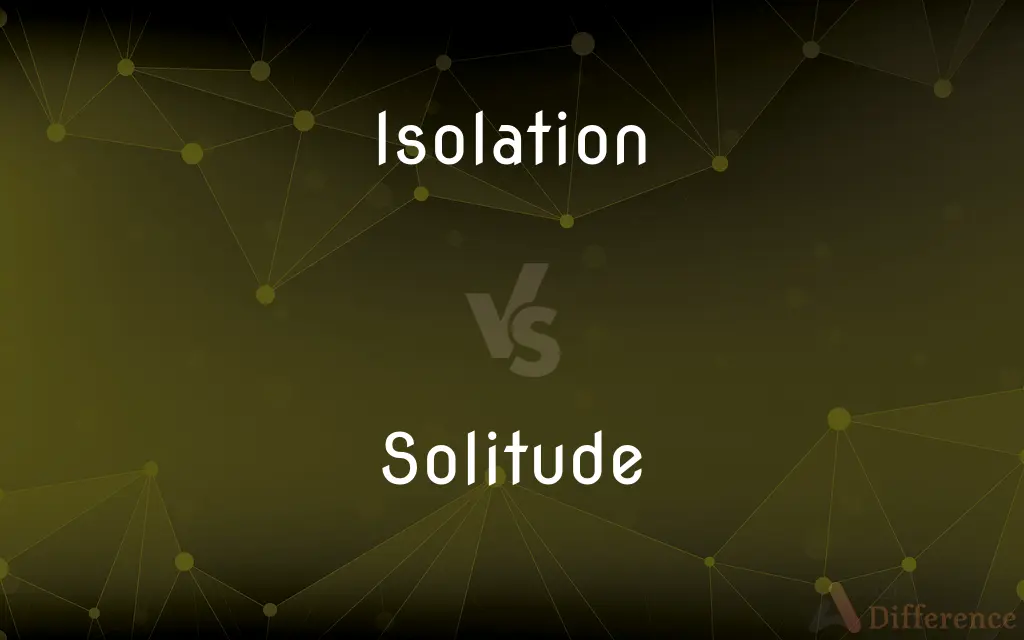Isolation vs. Solitude — What's the Difference?
By Tayyaba Rehman & Fiza Rafique — Published on October 17, 2023
Isolation refers to the state of being alone or separated, often against one's will, while solitude denotes a voluntary state of being alone, usually for reflection or peace.

Difference Between Isolation and Solitude
Table of Contents
ADVERTISEMENT
Key Differences
Isolation generally implies a state or condition where an individual or entity is set apart or removed from others. It often connotes a lack of social interactions and can be due to various reasons including health, societal structures, or external circumstances. On the contrary, solitude signifies a more intentional and voluntary state where one seeks to be alone, desiring time away from the bustle of daily life.
Solitude often carries a positive or neutral connotation, associated with reflection, inner peace, or personal growth. People might seek solitude for meditation, reading, or simply to enjoy nature. Isolation, however, tends to have a more negative undertone, suggesting unwanted separateness or enforced aloneness, which might result from quarantine, punishment, or social ostracism.
Moreover, isolation is not always a physical state. One can feel isolated even in a crowd, disconnected from others due to emotional or psychological barriers. Solitude, though, emphasizes the physical or emotional space where distractions are minimized, providing room for introspection or relaxation.
To summarize, while both terms involve being alone, isolation tends to highlight an imposed or undesired separation, whereas solitude underscores a chosen, often beneficial, state of aloneness.
Comparison Chart
Primary Definition
The state of being separated or alone, often not by choice.
A voluntary state of being alone for reflection or peace.
ADVERTISEMENT
Connotation
Generally negative or neutral.
Often positive or neutral.
Volition
Usually involuntary or imposed.
Usually voluntary and chosen.
Emotional Implications
Can evoke feelings of loneliness or abandonment.
Can evoke feelings of peace, reflection, or contentment.
Common Contexts
Quarantine, societal ostracism, emotional barriers.
Meditation, nature walks, reading, introspection.
Compare with Definitions
Isolation
The act of separating something from others.
The hazardous material was kept in isolation to prevent contamination.
Solitude
A state of peaceful seclusion.
He found solitude in his morning meditations.
Isolation
The condition of being alone, especially when it is not by choice.
The astronaut described the feeling of isolation in space.
Solitude
A place where one can be alone and undisturbed.
The cabin in the woods was his favorite place of solitude.
Isolation
The process of keeping someone separated from others for health reasons.
Due to the contagious nature of the disease, she was put in isolation.
Solitude
A temporary withdrawal from society for personal growth or peace.
After a hectic year, she took a month of solitude to recharge.
Isolation
A situation or place free from external influence or disturbance.
The lab was in complete isolation, ensuring no outside variables affected the experiments.
Solitude
The state of being alone, especially by choice.
She went to the mountains seeking solitude.
Isolation
A state where one feels emotionally distanced from others.
Even in a large city, he felt a profound sense of isolation.
Solitude
A state of reflection or introspection achieved in aloneness.
The artist claimed that his best work was done in moments of solitude.
Isolation
The act of isolating
Ordered the isolation of the sick patients.
Solitude
The state or quality of being alone or remote from others
Composers need solitude to work.
Isolation
The quality or condition of being isolated
Isolation on a desert island.
Solitude
The state of being secluded or uninhabited
Sought out the solitude of the forest.
Isolation
The state of being isolated, detached, or separated; the state of being away from other people.
She lived her final year in complete isolation, not wanting to see anybody.
Solitude
A secluded or uninhabited place
"Beyond his bleak sky-line there stretched vast solitudes" (Jack London).
Isolation
The act of isolating.
Solitude
Aloneness; the state of being alone, solitary, or by oneself.
Isolation
The state of not having diplomatic relations with other countries (either with most or all other countries, or with specified other countries).
Solitude
A lonely or deserted place.
Isolation
(chemistry) The obtaining of an element from one of its compounds, or of a compound from a mixture
Solitude
State of being alone, or withdrawn from society; a lonely life; loneliness.
Whosoever is delighted with solitude is either a wild beast or a god.
O Solitude! where are the charmsThat sages have seen in thy face?
Isolation
(medicine) The separation of a patient, suffering from a contagious disease, from contact with others (compare: quarantine)
Upon returning from the field, he went into isolation for a week so as not to infect anyone with potential diseases.
Solitude
Remoteness from society; destitution of company; seclusion; - said of places; as, the solitude of a wood.
The solitude of his little parish is become matter of great comfort to him.
Isolation
(databases) A database property that determines when and how changes made in one transaction are visible to other concurrent transactions.
Solitude
Solitary or lonely place; a desert or wilderness.
In these deep solitudes and awful cellsWhere heavenly pensive contemplation dwells.
O blest retirement, friend to life's decline.
Such only can enjoy the country who are capable of thinking when they are there; then they are prepared for solitude; and in that [the country] solitude is prepared for them.
It is a place of seclusion from the external world.
These evils . . . seem likely to reduce it [a city] ere long to the loneliness and the insignificance of a village.
Isolation
(psychology) A Freudian defense mechanism in which a person suppresses a harmful thought from developing into a train of thought.
Solitude
A state of social isolation
Isolation
The act of isolating, or the state of being isolated; insulation; separation; loneliness.
Solitude
A solitary place
Isolation
A state of separation between persons or groups
Solitude
A disposition toward being alone
Isolation
The act of isolating something; setting something apart from others
Isolation
A feeling of being disliked and alone
Isolation
Preference for seclusion or isolation
Isolation
(psychiatry) a defense mechanism in which memory of an unacceptable act or impulse is separated from the emotion originally associated with it
Isolation
A country's withdrawal from internal politics;
He opposed a policy of American isolation
Common Curiosities
Is solitude only physical?
No, solitude can also be a mental or emotional state of peacefulness.
Can you be in solitude and still feel connected?
Yes, solitude relates to physical aloneness, not necessarily emotional disconnection.
Can someone choose isolation?
Yes, someone might choose isolation for various reasons, like personal preference or safety.
Is solitude always voluntary?
Mostly, but one can find themselves in unintended solitude due to circumstances.
Is silence necessary for solitude?
Not necessarily; solitude emphasizes aloneness, not the absence of noise.
Is isolation always negative?
No, isolation can be neutral or even positive in contexts like scientific experiments.
Is solitude the same as loneliness?
No, solitude is chosen aloneness, while loneliness is a feeling of unwanted aloneness.
Can technology cause feelings of isolation?
Yes, excessive or improper technology use can lead to feelings of social isolation.
Does isolation imply a lack of social interactions?
Often, but one can also feel isolated due to emotional or psychological barriers.
Why might someone seek solitude?
For reflection, relaxation, personal growth, or to escape daily stressors.
Can isolation lead to negative health effects?
Prolonged or undesired isolation can have negative psychological and physical effects.
Can animals experience isolation?
Yes, animals can experience physical and emotional isolation similar to humans.
How is isolation used medically?
Patients with contagious diseases might be kept in isolation to prevent spreading.
Is solitude beneficial?
Often, solitude can provide benefits like mental clarity, stress relief, and personal growth.
Is nature often associated with solitude?
Yes, many seek nature to experience solitude and escape urban distractions.
Share Your Discovery

Previous Comparison
Reach vs. Achieve
Next Comparison
Standard Deviation vs. Standard ErrorAuthor Spotlight
Written by
Tayyaba RehmanTayyaba Rehman is a distinguished writer, currently serving as a primary contributor to askdifference.com. As a researcher in semantics and etymology, Tayyaba's passion for the complexity of languages and their distinctions has found a perfect home on the platform. Tayyaba delves into the intricacies of language, distinguishing between commonly confused words and phrases, thereby providing clarity for readers worldwide.
Co-written by
Fiza RafiqueFiza Rafique is a skilled content writer at AskDifference.com, where she meticulously refines and enhances written pieces. Drawing from her vast editorial expertise, Fiza ensures clarity, accuracy, and precision in every article. Passionate about language, she continually seeks to elevate the quality of content for readers worldwide.













































